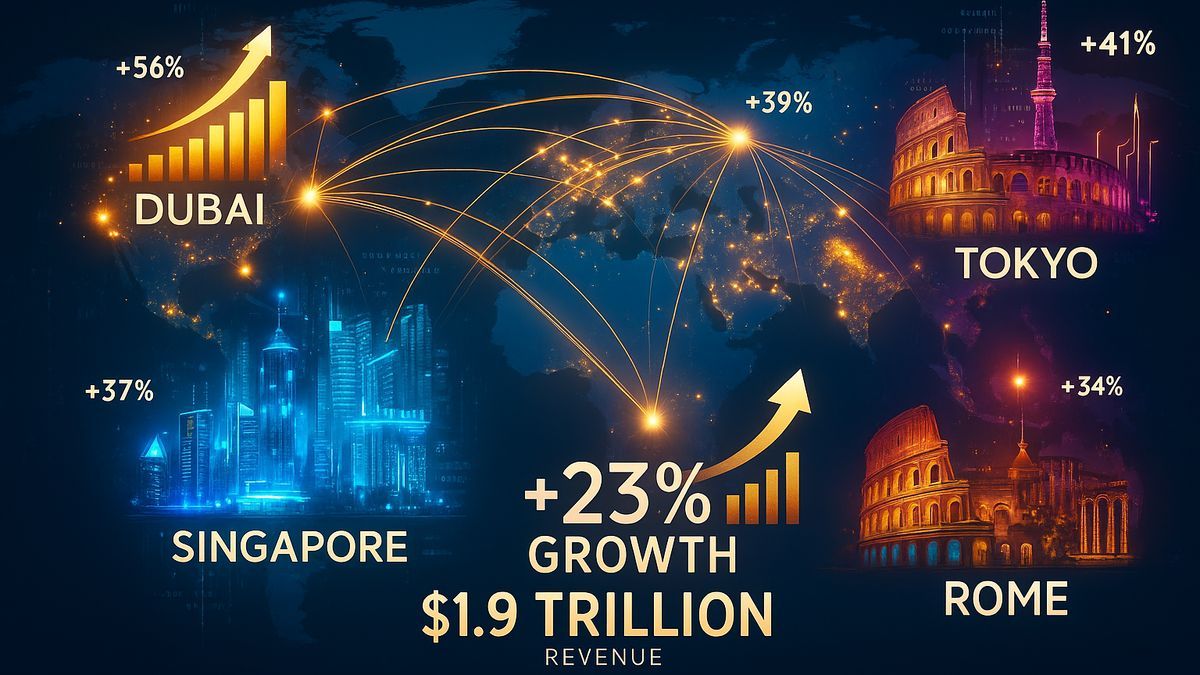2025 Tourism Boom: Why Cities Are Seeing Record Profits. The global travel industry is experiencing an unprecedented surge, with the 2025 Tourism Boom reshaping economic landscapes across the world. Cities from Dubai to Singapore and Paris to Tokyo are reporting record-breaking visitor numbers and tourism revenues that exceed even pre-pandemic projections. This remarkable recovery has transformed into explosive growth, creating opportunities that savvy destinations and travel companies, like MK Travel Bag, are strategically capitalising on.
The Numbers Behind the 2025 Tourism Boom
The 2025 Tourism Boom represents more than just recovery—it’s a complete transformation of how people travel and spend. International tourist arrivals have surged 23% above 2019 levels, with global tourism revenue reaching an estimated $1.9 trillion. Cities that invested in infrastructure improvements during the pandemic are now reaping extraordinary dividends, with some destinations reporting tourism revenue increases of 40%–60% compared to their historical peaks.
Major metropolitan areas are experiencing this windfall firsthand. Dubai’s tourism revenue hit $16.7 billion in the first nine months of 2025, while Singapore welcomed over 19 million visitors, generating record profits for local businesses. These figures demonstrate how the 2025 Tourism Boom is creating wealth not just for hotels and airlines, but for entire urban ecosystems.
Technology-Driven Travel Experiences Fuel Growth
The 2025 Tourism Boom is largely powered by technological innovations that have revolutionised how travellers discover, plan, and experience destinations. Artificial intelligence now personalises travel recommendations with unprecedented accuracy, while virtual reality previews allow potential visitors to “experience” destinations before booking. MK Travel Bag has embraced these technologies, offering clients AI-powered itinerary planning and immersive destination previews that increase booking conversion rates by over 35%.
Smart city infrastructure has become a major competitive advantage in capturing tourism dollars. Cities with seamless digital payment systems, real-time translation services, and integrated transportation apps are attracting significantly more visitors. Singapore’s Smart Nation initiative and Dubai’s AI-powered tourism services exemplify how technology investment during the 2020-2023 period is now generating massive returns during the 2025 Tourism Boom.
Revenge travel evolves into experience-seeking.
What began as “revenge travel” has evolved into sophisticated experience-seeking behaviour that defines the 2025 Tourism Boom. Modern travellers are no longer satisfied with basic sightseeing; they demand authentic cultural immersion, exclusive access, and personalised experiences that create lasting memories. This shift has created premium pricing opportunities for destinations and travel providers who can deliver these enhanced experiences.
Cities are responding by creating exclusive cultural programmes, behind-the-scenes access to iconic attractions, and luxury experiences that command premium prices. Rome’s private Vatican tours, Tokyo’s exclusive sake tasting experiences, and Dubai’s ultra-luxury desert adventures are examples of how destinations are monetising the experience economy that drives the 2025 Tourism Boom.
Sustainable Tourism Creates Premium Value
Environmental consciousness has become a profit driver rather than a cost centre during the 2025 Tourism Boom. Cities that invested in sustainable tourism infrastructure are commanding premium prices while attracting environmentally conscious travellers willing to pay more for responsible experiences. Costa Rica’s carbon-neutral tourism initiatives and Iceland’s renewable energy-powered attractions demonstrate how sustainability creates competitive advantages.
MK Travel Bag has observed that travellers are increasingly choosing destinations and experiences based on environmental credentials, with sustainable options commanding 15-25% higher prices than conventional alternatives. This trend is reshaping city planning and tourism investment strategies worldwide.
Digital Nomadism Extends Stay Duration
The rise of digital nomadism has fundamentally altered tourism economics during the 2025 Tourism Boom. Cities that adapted to accommodate long-stay visitors are seeing dramatically increased per-visitor revenue. Digital nomad visas, co-working spaces, and extended-stay accommodations have transformed tourism from short-term visits into month-long residencies.
Lisbon, Mexico City, and Dubai have emerged as digital nomad capitals, with average visitor stays extending from 4-7 days to 30-90 days. This extended duration multiplies spending across accommodation, dining, entertainment, and local services, creating unprecedented economic impact for host cities.
Infrastructure Investment Pays Dividends
Cities that maintained or increased infrastructure investment during the pandemic are now reaping extraordinary benefits from the 2025 Tourism Boom. New airports, expanded transportation networks, and enhanced cultural attractions are generating visitor volumes that exceed all projections. Doha’s FIFA World Cup infrastructure investments, Singapore’s Jewel Changi Airport, and Abu Dhabi’s cultural district demonstrate how strategic infrastructure spending creates long-term tourism competitiveness.
These investments enable cities to handle increased visitor volumes while maintaining service quality, preventing the overcrowding and infrastructure strain that historically limited tourism growth potential.
Regional Tourism Patterns Create New Opportunities
The 2025 Tourism Boom has created new regional travel patterns that benefit multiple destinations simultaneously. Multi-destination travel has increased 40% compared to pre-pandemic levels, with travellers combining multiple cities or countries in single trips. This trend has created opportunities for regional tourism cooperation and package development.
MK Travel Bag’s multi-destination packages, such as the Middle East Luxury circuit combining the UAE, Qatar, and Oman, have seen booking increases of 65% as travellers seek comprehensive regional experiences rather than single-destination visits.
Looking Forward: Sustaining the Momentum
The 2025 Tourism Boom represents a fundamental shift in global travel patterns rather than a temporary surge. Cities that recognise this transformation and continue investing in visitor experience enhancement, technological integration, and sustainable practices will maintain their competitive advantages long-term.
For travel industry professionals and destinations, the current boom creates both opportunities and responsibilities. Success requires balancing growth with sustainability, leveraging technology while maintaining human connection, and creating experiences that justify premium pricing while remaining accessible to diverse travellers.
As MK Travel Bag continues expanding its global destination portfolio, the 2025 Tourism Boom provides an unprecedented foundation for sustainable growth that benefits travellers, destinations, and local communities worldwide.
Experience the 2025 Tourism Boom firsthand with MK Travel Bag’s expertly curated travel experiences that showcase the world’s most dynamic destinations at their peak.


